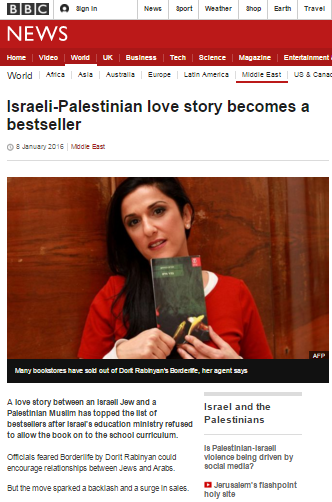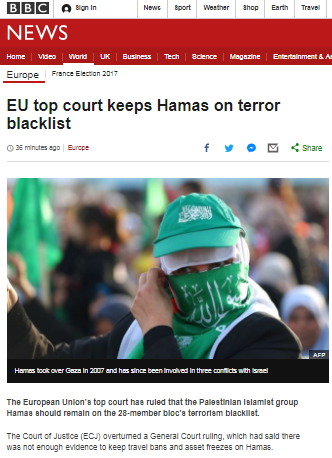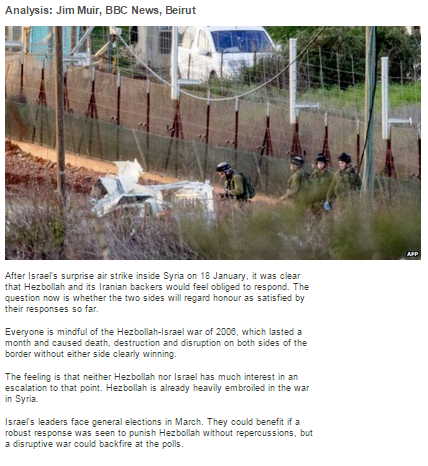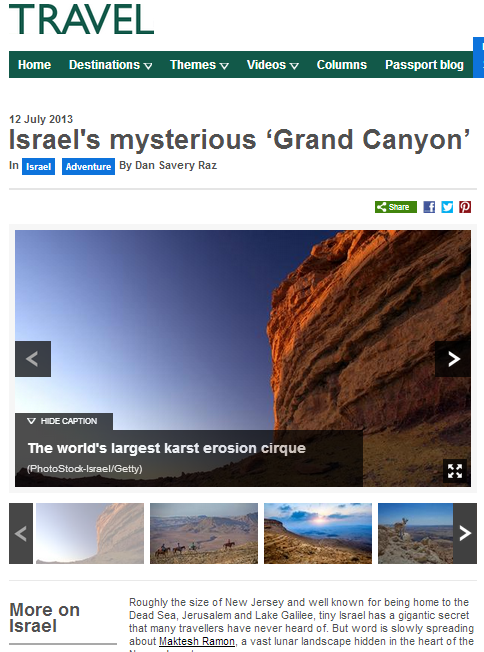Following on from the inaccurate portrayal by the BBC World Service on December 31st of the decision by a pedagogic committee not to include a novel in the Israeli high school curriculum as a “book ban”, visitors to the BBC News website’s Middle East page on January 8th found an article headlined “Israeli-Palestinian love story becomes a bestseller“.
As was also the case in Lyse Doucet’s item for the BBC World Service programme ‘Newshour’ (the abridged version of which is included in this report as a link), quotes from author Dorit Rabinyan are used to promote inaccurate impressions of Israeli “democracy”, “freedom of choice” and free speech.
“Ms Rabinyan’s agent said more than 5,000 copies of the book had been sold in a week, a large number in Israel’s small market, and many stores had sold out.
“I think this whole march to bookstores is a demonstration,” Ms Rabinyan told AFP. “It is not only my fans that buy Borderlife, it is the fans of Israeli democracy.
“By buying my novel they reconfirm their trust and belief in Israel’s liberalism, in Israel’s freedom of choice and speech,” she said.”
Apparently though, the writer of this article considered it necessary to include further ‘evidence’ in order to promote the theme of ‘dark’ Israel suppressing culture and artistic freedom.
“However, the apparent block has angered cultural figures and left-wing sections of Israeli society. […]
There has long been friction between the right-wing government of Benjamin Netanyahu and cultural figures.
In June, Education Minister Naftali Bennett removed state funding from a play that he said showed a Palestinian attacker in a sympathetic light.
And in November the country’s most famous living author Amos Oz said he would not attend events at Israeli embassies around the world in protest at government policies.” [emphasis added]
Let’s take a closer look at that penultimate paragraph composed of 23 words.
The play concerned is called “A Parallel Time” and it was produced by the Arabic language Al Midan Theatre in Haifa. Based on the life story of an Israeli Arab terrorist (not a “Palestinian attacker” as stated by the BBC) from Baka al Garbiya called Walid Daka who was part of a cell that kidnapped, tortured and murdered 19 year-old IDF soldier Moshe Tamam in 1984, the production prompted understandable objection from Moshe Tamam’s family.
As a result, Haifa municipality suspended its publicly sourced funding provided to the theatre company until the results of an investigation were presented. At the recommendation of the chairman of the Israel Arts and Culture Council, state funding from the Ministry of Culture and Sport was also frozen pending investigation. That decision prompted a protest by some of those “cultural figures and left-wing sections of Israeli society” mentioned in this article which, as the Jerusalem Post noted, included an incident which one might have thought would be of interest to those claiming to be concerned about freedom of speech in Israel.
“Two things happened at Sunday night’s gathering in Jaffa of several hundred performing arts celebs who protested against Culture Minister Miri Regev’s decision to withhold government funding from a theatrical production based on the writings of terrorist Walid Dakka. It should be recalled that Dakka abducted, tortured and then murdered 19-year-old soldier Moshe Tamam in 1984. […]
Tamam’s niece Ortal attended the anti-Regev rally and sought to appeal to the conscience of the participants. She asked that they not forget the nature of Dakka’s brutal crime. As soon as she began speaking, Ortal Tamam was loudly heckled and booed by the purported upholders of freedom of expression. Some even shouted: “Shut up! Get off the stage!” In the end, she did. She was not allowed to say her piece.
Nothing underscores the hypocrisy of the assembled luminaries more than their insensitivity toward a bereaved family’s pain. They refused to let another viewpoint be sounded.”
So what has the minister named by the BBC in this article to do with the story? The play was initially included in the Ministry of Education’s ‘culture basket’ of state-funded performances for school pupils. Education Minister Naftali Bennet decided in June that this particular play should no longer be included in that programme.
In other words, whilst the Minister of Education decided that it was not appropriate to use public money to take schoolchildren to see a play about a convicted terrorist, it was not – as claimed by the BBC – he who “removed state funding” from the play or the theatre company but the Minister of Culture and Sport.
And what of the BBC’s claim that it was only Bennett who “said” that the play portrays its protagonist in a “sympathetic light”? The play’s writer and director Bashar Murkus would most likely agree with that seeing as he is on record as saying that he “identified with Daka” and that the play “shows the “human angle” of the prisoner”. Together with the inaccurate description of Walid Daka as “Palestinian” and an “attacker”, that means that BBC audiences have been misled four times in this 23 word sentence.
It is very obvious that the purpose of the inclusion of this paragraph in the article was to add weight to the overall theme of a dark, “right-wing government” censoring enlightened “cultural figures”. However, the theatre company has not been censored and – as Israeli journalist Ben Dror Yemini pointed out at the time – democracy is not endangered.
“In an interview with Israel Radio, Prof. Nissim Calderon argued that democratic states don’t intervene in cultural content. Calderon is right. Democratic states also fund critical cultural performances. And that’s how it should be. No one in a democracy, however, requests funding for shows that glorify terrorists, or turns a murderer, from al-Qaeda or the Taliban, into a “political prisoner.””
Had the writer of this article intended it to be a balanced report, he or she would also have had to give readers some idea of the additional agenda of the “cultural figures” which staged the play mentioned. As Yemini notes in his article:
“Over and above being merely a theater, Al-Midan in Haifa is a political institution. The following are some of the establishment’s landmark events in recent years: In October 2007, Al-Midan staged a convention against the enlistment of Arab youth in national service programs, with MK Jamal Zahalka branding the volunteers as “lepers” in an address to the audience. Islamist Raed Salah, a convicted agitator, participated in the conference.
In January 2009, the theater was scheduled to host a gathering in support of the Popular Front organization. The police commissioner issued a closure order.
In June 2010, Al-Midan held an event in support of two individuals arrested for spying for Hezbollah. The two were subsequently convicted.
In February 2012, on the backdrop of atrocities committed by Bashar Assad against his own people, the theater staged a convention in support of the Syrian president.
In March 2015, it hosted a festival in conjunction with a radical group that flies the flag for the so-called right of return. A similar event at the Tel Aviv Cinematheque sparked a demand from former culture minister Limor Livnat to suspend its funding.
In May 2014, Al Midan staged A Parallel Time at a theater in Qalansuwa. Convicted terrorist Samer Issawi, released in the Gilad Shalit prisoner-exchange deal, spoke at the event. Issawi has since been returned to prison after violating the terms of his release and indulging in terrorist activity. The play was staged again in April 2015, in the framework of “Palestinian Prisoners’ Day.” And again a convicted terrorist was in attendance Mounir Mansour, who was released in the Jibril deal.”
And despite all that (and bearing in mind that Israel has had what the BBC would classify as a “right-wing government of Benjamin Netanyahu” since March 2009):
“…most of its budget comes from the state (more than NIS 1 million from the Culture Ministry, and another NIS 1.25 million or so from the Haifa Municipality).”
Of course the inclusion of that information would not have furthered the fictional and facile impressions that the writer of this report is trying so hard to create.




